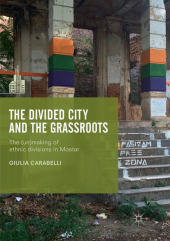 Neuerscheinungen 2019Stand: 2020-02-01 |
Schnellsuche
ISBN/Stichwort/Autor
|
Herderstraße 10
10625 Berlin
Tel.: 030 315 714 16
Fax 030 315 714 14
info@buchspektrum.de |

Giulia Carabelli
The Divided City and the Grassroots
The (Un)making of Ethnic Divisions in Mostar
Softcover reprint of the original 1st ed. 2018. 2019. xv, 191 S. 11 SW-Abb. 210 mm
Verlag/Jahr: SPRINGER, BERLIN; SPRINGER SINGAPORE 2019
ISBN: 9811340005 (9811340005)
Neue ISBN: 978-9811340000 (9789811340000)
Preis und Lieferzeit: Bitte klicken
Focusing on Mostar, a city in Bosnia Herzegovina that became the epitome of ethnic divisions during the Yugoslav wars, this cutting edge book considers processes of violent partitioning in cities. Providing an in-depth understanding of the social, political, and mundane dynamics that keep cities polarized, it examines the potential that moments of inter-ethnic collaboration hold in re-imaging these cities as other than divided. Against the backdrop of normalised practices of ethnic partitioning, the book studies both ´planned´ and ´unplanned´ moments of disruption; it looks at how networks of solidarity come into existence regardless of identity politics as well as the role of organised grassroots groups that attempt to create more inclusive; and it critically engages with urban spaces of resistance. Challenging the representation of the city as merely a site of ethnic divisions, the author also explores the complexities arising from living in a city that validates its citizens solely through ethnicity. Elaborating on the relationships between space, culture and social change, this book is a key read for scholars, students, and urban practitioners studying ethnically divided cities worldwide.
Introduction.- Imagining, Planning and Building Mostar after the War.- The Everyday Life of Mostar.- Grassroots Movements and the Production of (other) Space(s).- Conclusion.
"What makes this book stand out in comparison to many other ethnographic and sociological studies on Mostar, is its focus on practices, affects and experiences, rather than on the production of narratives. In so doing, it provides a refreshing perspective. In conclusion, this is a must read for every researcher dealing with Mostar or Bosnia and Herzegovina more broadly. ... Most importantly, it offers a sense of movement to the city of Mostar through providing a much-needed and well-deserved agency and a will for a change among its citizens." (Gustav Wollentz, Space and Polity, November, 2018)
Giulia Carabelli is a Research Fellow at the Max Planck Institute for the Study of Religious and Ethnic Diversity, Gottingen, Germany. She holds a PhD in Sociology at Queen´s University Belfast, a Masters in Research Architecture at Goldsmiths College, London and a BA in History of Islamic Architecture at Ca´Foscari University of Venice. Her research interests lie at the intersection of urban sociology, cultural studies, and political theory. She received the Higginson Leadership Award in 2014.


